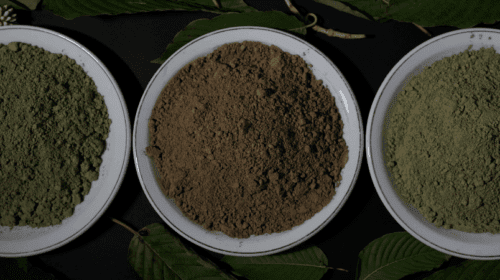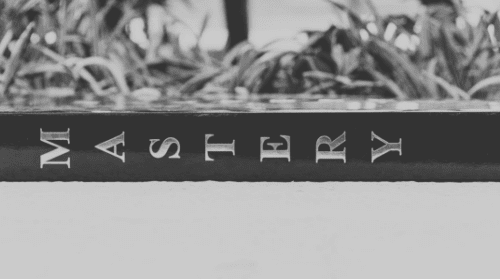Trigger warning: Mention of explosions, addiction, arrest. This article does not contain stories of physical or sexual trauma.
A foreword from our Clinical Director:
PTSD, or Post-Traumatic Stress Disorder, is a mental health injury that can develop following a traumatic event. Symptoms vary but often include flashbacks, nightmares, anxiety, and intrusive thoughts. PTSD can cause disruption in a person’s daily life and typically requires therapy and medication for management. Recovery is unique to each person, but healing from trauma is possible. Post-traumatic growth describes the positive changes people may experience after facing traumatic events, and may include increased personal strength, better relationships, a deeper appreciation for life, and new opportunities. Though it doesn’t erase the difficulties of trauma, it does demonstrate how resilience and personal growth can follow adversity. For people experiencing symptoms of PTSD, Recovery Unplugged provides trauma-informed care programs with both in-person and online options.
-Anna Griest, LPC-MHSP
Something I’ve always enjoyed about working at Recovery Unplugged is being around people who are loudly, weirdly, and unapologetically themselves. Being surrounded by the faithful followers of a recovery-oriented lifestyle that’s built on honesty and authenticity offers a much more intimate picture of the people you work with than you might have in other industries. Sure – you may celebrate a coworker’s promotion or professional milestones, but when you know that same coworker once stole a congressman’s car and crashed it into a tree, you feel that much prouder of them knowing the place they came from. There’s a special comfort in working alongside people who, just like you, are flawed and complex creatures.
June is PTSD awareness month, and in keeping with our tradition of telling the outright truth about life in recovery, I asked our staff to share stories of their own experience with PTSD – what happened, what it taught them, and what they are still working to overcome.
Andrew: Explosion
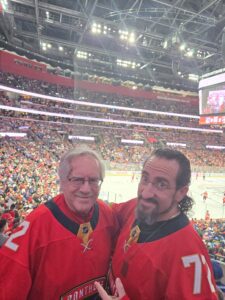
B: You have lived experience as a survivor of a kind of freak accident, tell me about what happened.
A: In 2021, I invited a group of about 25 people over for an outdoor BBQ. A friend and I went to turn on the gas grill without realizing there was a leak. When he pushed the button, the grill exploded – and we exploded with it.
B: Was anyone else around you at the time?
A: No, thankfully. My son and my friend’s daughter had been at the grill just a few minutes earlier, and I’m grateful they weren’t there or it probably would’ve been a lot more devastating.
B: What happened next?
A: We were taken to the Ryder Burn Unit at Jackson Memorial in Miami, where we started what was, for me, one of the most difficult moments of my life. I had severe second-degree burns all over my body and had to have my wound dressings changed daily. The pain was just enormous.
B: Was there anything that helped you cope with the discomfort in the aftermath of the explosion?
A: Actually, yes. I’m obviously a believer in the power music has on mood and recovery, and the nurses could see how stressful the wound dressing had become to me, it made them very tense which I think made it worse for everyone. I started asking them to pick a song off my phone to listen to while they were working on me and found that they seemed calmer with music playing. Seeing them calm lessened my own anxiety considerably.
B: What about after you left the hospital? How was the recovery process in those early days?
A: The whole thing was painful, and very scary. I didn’t know if I’d be able to move the way I’d done before, and was nervous about not being able to take walks with my children anymore. To this day I still have pain in my feet where the most severe burns were. People see me out and about in a suit and flip-flops and they think I’m just some weird business man from South Florida, because of course they don’t know that it’s actually very uncomfortable for me to wear other types of shoes.
B: How were you doing mentally during all of this?
A: I got by OK. I did have nights where I woke up panicked because I’d had a bad dream. Several months afterwards I was at a music festival where Machine Gun Kelly was playing; I was standing right at the front and didn’t know he had pyrotechnics as part of his show and a huge flame shot up in front me of, which made me jump back just a bit and brought up some bad memories. A big part of what helped me early was my mindset. Since I was a kid, I’d been listening to Zig Zigler, Les Brown, Tony Robbins…and they helped shape the way I thought. When I was in high school, I had this idea that I’d join the football team despite every indication I wasn’t built for it. I made the team not because I was good, but because I refused to get off the field when it got tough. You carry that mentality with you for long enough and it becomes second nature. Life keeps moving and you have to move with it.
B: What is something this experience taught you about yourself, and what is something you still struggle with?
A: I have pain daily, even three years later. I had to learn new limitations and ways of existing and that’s always difficult. I take a walk with my kids every morning and instead of complaining about those new limitations, I celebrate the fact that I’m still here to spend time with the people who matter the most. I won’t put myself in a situation that brings me pain, but I don’t use the experience as an excuse not to live my life.
Teagan: Arrested at Home
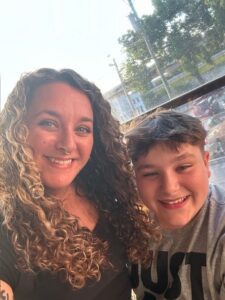
B: Whenever people think of PTSD, they usually think of these huge events that leave tangible evidence that something went wrong…but your story is a little bit different. Can you tell me about it?
T: When I was 18, I started getting into trouble with the law. One day I was at my mom’s house, my whole family was there just hanging out. We heard a knock at the door and I didn’t think anything of it. My mom opens the door to two county sheriffs standing there and one of them asked “Where’s Teagan at?” I’d met the police several times at that point, and it was never good. Sometimes it was about selling drugs, other times it was about probation violations they’d caught wind of. Once it was even to serve me an eviction notice from my apartment. I felt sick when they called my name. My body was vibrating, and my palms were sweaty. Emotionally, I was full of fear. I could feel the anxiety building up in my chest. I was angry. I was disappointed and sad beyond belief.
B: And your family was watching this happen?
T: My mom, son, brother, sister-in-law, and my nephew. My mom was surprised, confused and sad. My brother and his wife were worried, but they weren’t surprised. The kids were oblivious to what was going on, they were just really confused. When they arrested me and placed me in the back of the cop car, I remember my son started crying.
B: What happened next?
T: I was in jail. There wasn’t much I could do but cry and fester on the reasons I was there in the first place. I thought about how my son must think of me and it made me feel so disappointed in myself.
B: Do you think that shame and disappointment changed your priorities?
T: It did. When I got out, I made sure to stay out of trouble. I stopped going around old friends, took responsibility for my actions, and paid all of my fines. I held a steady job and I spent more time at home with my family, and all my bills were paid. That was my life.
B: What kind of support system did you have while you got back on your feet?
T: My family was my biggest support. I also had a probation officer that held me accountable. I started therapy as well, which was a huge help in just learning about myself.
B: How do you think your arrest changed your perspective on life?
T: Getting arrested changed my perspective completely. It made me realize that I didn’t want to miss out on my son’s life or time with my family. It made me so much more grateful for the things that I have in my life. I know now that I can lean on my family when I’m hurting. All my bills are paid. I learned that allowing yourself to be vulnerable was the best way to show up for yourself, and that the fear that comes with exposure can be an opportunity to choose something different – something better – for yourself.
B: How has it been recovering from that experience? Are there things you still have to work through?
T: I still struggle with the thought of hurting my son and my family like I did that day. Every time someone knocks on my door and I’m not expecting anyone, the same emotions and the physical feelings from that day all come rushing back.
B: Have you found ways to cope with those feelings when they come up?
T: I close my eyes and take a deep breath and remind myself that I’m not in any trouble. I’m no longer on probation. All my bills are paid. Almost like a mantra…
B: What do you feel proud of in your life right now?
T: I have become much more responsible, more family-oriented, and I’ve learned to manage my money better. I try not to miss even a day of work so I’m never late on my bills. I am more empathetic to others that are struggling, I try to help whenever and wherever I can.
B: If you could talk to your younger self when she was sitting inside of a jail cell, what would you say?
T: These feelings are only temporary. This is a learning opportunity, and we can grow from this. These moments don’t have to define who we are as a person.
B: What are your hopes for the future?
T: I hope that I can learn to be more open about my feelings in the moment, to be able to set boundaries and hold them better, and to be more in-tune with my inner self to recognize my feelings and work through them in a healthy way.
Riley: Serious Injury
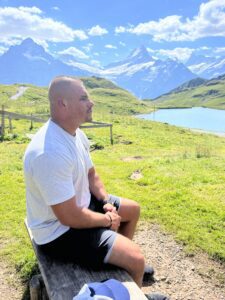
B: So you’ve been in recovery for 10 years now, but you once had an injury so serious that it threatened your sobriety…what happened?
R: At 7 years sober I was playing on our alumni softball team. Going all out & giving my all to whatever I’m doing is something I pride myself on, so naturally I was doing just that on the softball field that night. While I was running in the outfield to catch a deep fly ball there was a deviation in the ground that my left foot landed in. My knee hyperextended and I tumbled forward into the fence. My immediate thoughts were one: something very, very wrong had just happened, and two: I did not catch that fly ball. I lay there in some of the worst pain I’d ever experienced. I tried to get up, but couldn’t…. I kept thinking that I just needed a few minutes and I’d be right back out there because there’s no way I’m hurt hurt.
B: Who was with you?
R: I was with numerous friends and alumni of Recovery Unplugged. No one really knew what to think at first, I think they were waiting for me to get up too. Once they realized something was wrong though, they all ran to me and helped me off the field. I’m a person who likes to help but doesn’t like to need help, so I drove myself to the hospital that night. Come to find out I’d shattered my tibia and needed surgery urgently.
B: How did the surgery go?
R: The surgery went badly…an 8-inch plate and 7 screws were put into my leg. The nerve blocker didn’t work, and I woke up screaming and telling the hospital staff to just take my leg. The pain was so intense I thought I’d rather lose a limb. They spent three hours post-surgery just getting my pain under control. I spent an additional two days in the hospital, and was released with orders to continue narcotic pain medication for two full months.
B: We’ve talked about this before, but recovery for you has been a lot about self-discipline. You don’t take anything that alters the control you have over yourself. What was it like to be in long-term recovery and be told you had to start taking narcotics?
R: My doctor knew my history and was still adamant that I have something to ease the incredible amount of discomfort I was in after my injury. I didn’t want to take pills, I didn’t want to risk that loss of control, but I’m a believer in our intentions as people in recovery. Taking those pain meds was the only way I could survive, and I never had the mindset of “I can’t wait to feel different when I take this.” I tried discontinuing the medication on my own after a while – an ill-placed attempt to enforce my own will over the situation – and that resulted in another trip to the hospital to relieve the swelling and pain.
B: What was the hardest part of that recovery?
R: There was a point towards the end of that 2-month window I had the thought “Maybe I’ll call the doctor and get some extra pills for a couple more weeks.” I caught myself falling back into old ways of thinking and it scared me. In the years after getting help for my addiction, I’d grown so much. I’d become a man I was proud of, stable in my personal and professional life, and someone who could lead others and be relied upon. I knew if I didn’t react to the thoughts I was having, I’d be putting myself and the progress I’d made at risk – and it wasn’t worth it. I got home that night and flushed 20+ pain pills down the toilet, then called my sponsor. I went back to work the next day – it’s June and over 100 degrees mind you – and I showed up on my crutches wearing pants, two jackets, and a winter coat. I spent the day pouring sweat, going to the bathroom, and feeling like I was freezing to death. At 7 years sober I was in the middle of full-blown opiate withdrawals. By the grace of God, I made it through the day and woke up the next morning feeling much better.
B: What do you think going through all of that taught you about yourself?
R: I’m not 10 feet tall and bullet proof. As difficult as that whole experience was, it gave me a new perspective on how I handle roadblocks in my life. My approach to problem solving has since shifted away from my usual run-body-through-wall method, to slowing down and assessing what the problem is then deciding how to tackle it.
B: Do you still tackle problems with your whole body?
R: Not on these knees. My leg has never gotten back to 100%; it’s left me with some physical limitations, as well as mental obstacles. 2 weeks ago, I had another major surgery on my stomach and was obsessive about taking as few pain medications as possible.
B: The story of a person in recovery being prescribed opioids or benzodiazepines due to extenuating circumstances isn’t that uncommon, but I feel like we don’t hear about it a lot. What would you tell someone in your situation?
R: Life is tough, and it will knock you down. Getting back up is the one thing we can control. Something I had to give myself a lot of grace on was just accepting that I wasn’t OK. I had a great team behind me reminding me that it was OK to not be OK, but that there is a way to get OK. I believe we – all of us – can walk through anything with the right support system in place.
Reflections
When I first set out to conduct interviews for this piece, my goal was to highlight both the ongoing challenges and the moments of growth that can coexist in a person recovering from PTSD. In hearing the stories of my colleagues, however, I discovered a theme altogether different than that of recovery: Transformation.
Three very different stories from three very different people all somehow seem to reach the same conclusion – that we survive our lowest moments not to return to who we were before, but to become who we’re meant to be after. Transformation gives the impression that something new will take the place of the old, that something familiar will have to cease to allow space for something foreign – but a person can be happy, hurting, and healing all at once without losing those pieces that give their souls depth.
That we may share that depth with others seeking transformation is among the greatest of privileges.






















